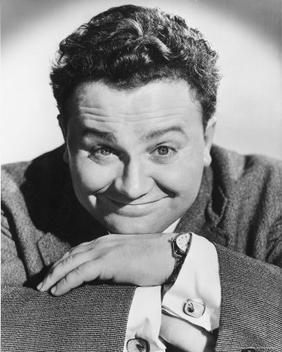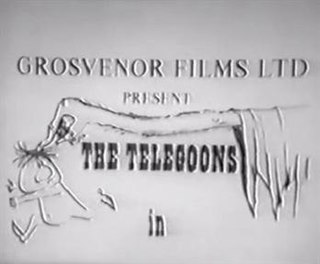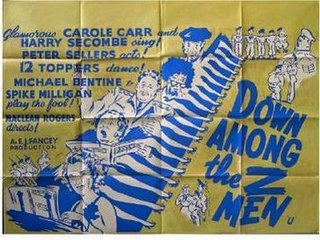
Sir Harry Donald Secombe was a Welsh actor, comedian, singer and television presenter. Secombe was a member of the British radio comedy programme The Goon Show (1951–1960), playing many characters, most notably Neddie Seagoon. An accomplished tenor, he also appeared in musicals and films – notably as Mr Bumble in Oliver! (1968) – and, in his later years, was a presenter of television shows incorporating hymns and other devotional songs.

Peter Sellers was an English actor and comedian. He first came to prominence performing in the BBC Radio comedy series The Goon Show. Sellers featured on a number of hit comic songs, and became known to a worldwide audience through his many film roles, among them Chief Inspector Clouseau in The Pink Panther series.

The Goon Show is a British radio comedy programme, originally produced and broadcast by the BBC Home Service from 1951 to 1960, with occasional repeats on the BBC Light Programme. The first series, broadcast from 28 May to 20 September 1951, was titled Crazy People; subsequent series had the title The Goon Show.
Eccles, also referred to as 'The Famous Eccles' or 'Mad Dan Eccles', is the name of a comedy character, created and performed by Spike Milligan, from the 1950s BBC radio comedy series The Goon Show. In the episode "The Macreekie Rising of '74", Peter Sellers had to fill in for the role in Milligan's absence. Very occasionally, he was referred to as 'Field Marshal' Eccles.
Bluebottle is a comedy character from The Goon Show, a 1950s British comedy radio show. The character was created and performed by Peter Sellers.
Neddie Seagoon was a character in the 1950s British radio comedy show The Goon Show. He was created and performed by Welsh comedian Harry Secombe. Seagoon was usually the central character of a Goon Show episode, with most plots involving or revolving around him.
Hercules Grytpype-Thynne was a character from the British 1950s comedy radio programme The Goon Show. He was voiced by Peter Sellers. In the episode "Who Is Pink Oboe?", Valentine Dyall filled-in for the role in Sellers' absence.
Count Jim Moriarty is a character from the 1950s BBC Radio comedy The Goon Show. He was voiced by Spike Milligan. In the episode "The Macreekie Rising of '74", Harry Secombe filled-in for the role in Milligan's absence.
Henry Crun and Minnie Bannister are two characters from the 1950s United Kingdom radio comedy series The Goon Show. Crun and Min were performed by Peter Sellers and Spike Milligan respectively.
Major Denis Bloodnok is a fictional character from the 1950s BBC Radio comedy The Goon Show. He was voiced by Peter Sellers.

The Telegoons is a comedy puppet show, adapted from the highly successful BBC radio comedy show of the 1950s, The Goon Show produced by Tony Young for BBC television and first shown during 1963 and 1964. Two series of 13 episodes were made. The series was briefly repeated immediately after its original run, and all episodes are known to have survived. Harry Secombe, Peter Sellers and Spike Milligan reprised their original voice roles from the radio series and appeared in promotional photos with some of the puppets from the series. Among the puppeteers were Ann Field, John Dudley, and Violet Phelan. The original radio scripts were adapted by Maurice Wiltshire, who had previously co-written a number of radio episodes with Larry Stephens.
This is a list of running jokes and catchphrases in the 1950s British radio programme The Goon Show.

Down Among the Z Men is a 1952 black-and-white British comedy film directed by Maclean Rogers and starring the Goons: Spike Milligan, Peter Sellers, Michael Bentine and Harry Secombe.
"The Fear of Wages" is an episode of the British radio comedy The Goon Show, written by Spike Milligan and Larry Stephens. As the 25th episode of the sixth series, it was first broadcast on 6 March 1956 and was among the shows first repeated in the 1970s following the success of The Last Goon Show of All in 1972.
"Six Charlies in Search of An Author" is an episode of the British radio comedy, The Goon Show. It was first broadcast on 26 December 1956.
The Dreaded Batter-Pudding Hurler of Bexhill-on-Sea is an episode from series five of the 1950s BBC radio comedy The Goon Show, first broadcast on 12 October 1954. It was written by Spike Milligan, who chose Bexhill-on-Sea as the location because he had been stationed there in World War II.

The Last Goon Show of All is a special edition of the BBC Radio comedy programme The Goon Show commissioned as part of the celebrations of the 50th anniversary of the BBC. Simulcast on radio and television on 5 October 1972, the performance reunited Spike Milligan, Peter Sellers and Harry Secombe as well as other contributors to the programme's original run. It was later released as a long-playing record and on compact disc. The video recording of the television broadcast was also released on VHS and later on DVD, although with some omissions. In early October 2007, 35 years after the original broadcast, a full unedited version was broadcast on BBC 7, the digital radio channel dedicated to re-runs of classic shows.
The "Ying Tong Song" is a novelty song written by Spike Milligan and performed by the Goons, usually led by Harry Secombe. It is a nonsense song, consisting of small verses interspersed by a completely nonsensical chorus. The origin of the title is said to have come from Harry Secombe's mispronunciation of the name of Milligan's war-time friend and fellow jazz musician, Harry Edgington. When Secombe repeatedly called him "Edgerton", Milligan replied, "it's Edgington, Edgington" and emphasized the point by saying "Yington, Yingtang".
The Histories of Pliny the Elder is a parody of the occupation of Britain by the Romans, from series seven of the 1950s BBC radio comedy, The Goon Show, first broadcast on 28 March 1957.
The ultimate source from which almost all Goon Show character lists on the internet have been derived is
Character descriptions were given in two of Milligan's books of scripts (he has written a back story to his characters which is not always consistent with the scripts) :





